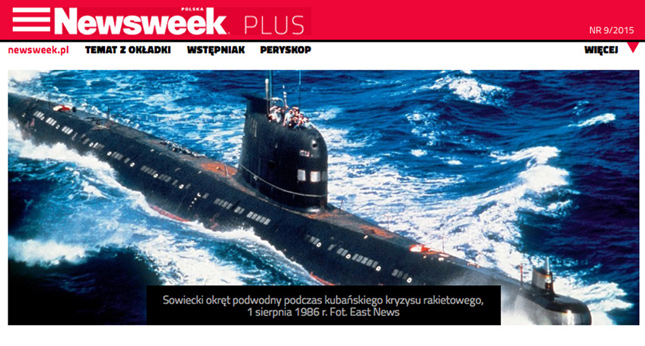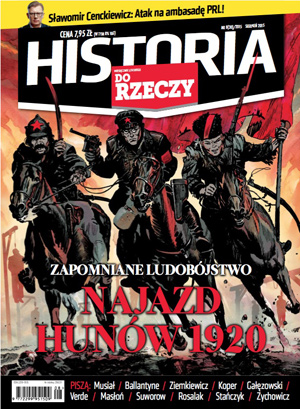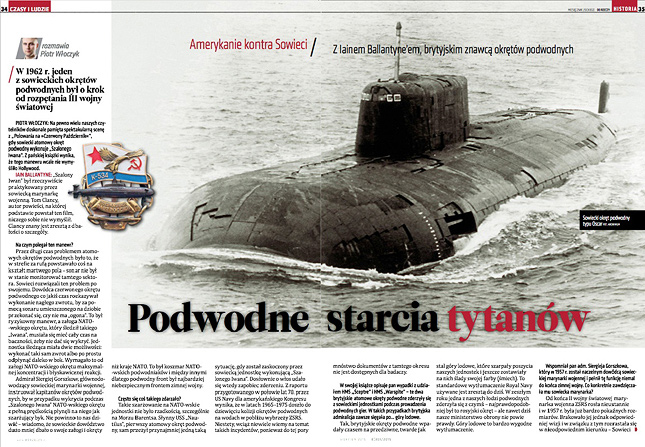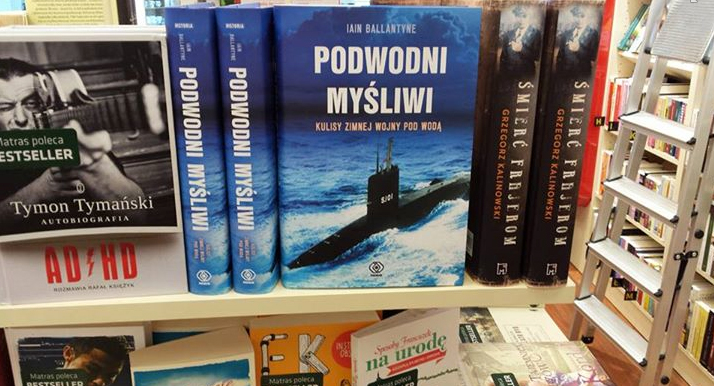A cult techno-thriller
The Polish edition of ‘Hunter Killers’ has been published by Rebis. It has garnered attention across a range of blogs and on various web sites, not least an article in the Polish edition of ‘Newsweek’.

Reporter Mariusz Nowik suggested that had ‘Podwodni Myśliwi’ (or ‘Underwater Hunters’, as the Polish edition has been re-christened) been published decades earlier, ‘it would have ended up creating an international scandal.’
According to his ‘Newsweek’ piece ‘Underwater Hunters’ manages to ‘reveal scenes of Cold War operations mainly in the Atlantic and the Barents Sea, which until recently were known mainly [only by] retired officers of the Royal Navy and the Soviet submarine forces.’
 However, the star turn for raising awareness of ‘Underwater Hunters’ has to be Piotr Wloczyk who interviewed me for an expansive Q&A interview on topics related to the Cold War under the sea. This was published in ‘Historia do Rzeczy’ – a serious major military history magazine, of 100 pages, aimed at the national market – whose production values are exceedingly high.
However, the star turn for raising awareness of ‘Underwater Hunters’ has to be Piotr Wloczyk who interviewed me for an expansive Q&A interview on topics related to the Cold War under the sea. This was published in ‘Historia do Rzeczy’ – a serious major military history magazine, of 100 pages, aimed at the national market – whose production values are exceedingly high.
In his blog, posted at the end of July, Tomasz Borówka asked if ‘Underwater Hunters’ was the ‘historic book for the summer?’ His answer was: ‘With the greatest pleasure!’ Observing that it is ‘a fascinating story about British submarines during the Cold War’ Mr Borówka also related: ‘When I spotted this book on the shelf in the supermarket and recognized the author’s name on the cover, I made the decision to purchase in a split second. Iain Ballantyne is a writer few people in Poland have heard of (as far as I know “Underwater Hunters” is his first book translated into Polish). This author is, though, widely known elsewhere, and for dealing with the history of the Royal Navy at war.’
Mr Borówka mentions one of my other books (‘Warspite’), which he has read and also recommends to anyone with an interest in such things. This leads him on to mention that the ‘modern submarine’ successor of the WW1 and WW2 battleship Warspite (main player in the above book) is featured in ‘Underwater Hunters’.
After observing that Cold War era British submariners ‘often rubbed shoulders with death’ Mr Borówka suggests ‘Underwater Hunters’ reads like ‘a cult techno-thriller.’
It is though, he remarks, ‘one hundred percent based on facts, established through relationships of people who over the years risked their lives in hostile depths of the ocean.’

According to the ‘HISTORIAXXWIEKU’ blog ‘Underwater Hunters’ is a book that ‘deserves the attention of all those who are interested in such Cold War, and the history of naval warfare.’
Meanwhile my friend, and fellow UK-based author, Richard Hargreaves – while on a recent research trip for his next book in Poland – found not only copies of his latest book but also ‘Underwater Hunters’ (in a shopping mall bookshop in Lublin, in the south-east of Poland). Richard’s excellent, visceral epic of the final days of the Third Reich is in the UK called ‘Hitler’s Final Fortress – Breslau 1945’. In Poland it’s ‘Ostatnia Twierdza Hitlera. Breslau 1945’
 ‘Underwater Hunters’ on sale in Lublin
‘Underwater Hunters’ on sale in Lublin
The fact that some of the Polish reviews and articles have referenced ‘Killing the Bismarck’ is appropriate. The German battleship set out on her ill-fated maiden voyage from Gotenhafen (the Polish port of Gdynia, captured and renamed by the Nazis in 1939 only assuming its previous name again at the end of WW2). I visited Gdynia in 1999, to report on a NATO exercise, staying aboard the US Navy cruiser USS Hue City.
‘Killing the Bismarck’ tells the epic story of the Kriegsmarine flagship’s breakout into the Atlantic, the destruction of HMS Hood and her subsequent destruction at the hands of a Royal Navy battle group.
Bearing in mind the hunger in Poland for military and naval history, I have often thought that ‘Killing the Bismarck’ deserves a Polish edition, too. Should ‘Underwater Hunters’ prove a success maybe someone will come knocking to put a Polish edition of ‘Killing the Bismarck’ on the market, too?